
International Journal of Cardiology Cardiovascular Risk and Prevention
Scope & Guideline
Fostering Global Collaboration in Cardiovascular Research
Introduction
Aims and Scopes
- Cardiovascular Risk Assessment and Management:
The journal emphasizes studies on the identification, evaluation, and management of cardiovascular risk factors, including hypertension, diabetes, dyslipidemia, and obesity. - Innovative Therapeutic Approaches:
Research on novel therapies, including pharmacological treatments, lifestyle interventions, and emerging technologies for cardiovascular disease prevention and management. - Population Health and Epidemiology:
Focus on epidemiological studies that explore demographic trends, health disparities, and the impact of socioeconomic factors on cardiovascular health outcomes. - Patient Education and Self-Management:
Investigating the role of patient education and self-care practices in managing cardiovascular diseases and improving adherence to treatment protocols. - Systematic Reviews and Meta-analyses:
The journal publishes comprehensive reviews that synthesize existing research to provide insights into best practices and emerging trends in cardiovascular risk management. - Interdisciplinary Research:
Encouragement of studies that bridge various disciplines, including cardiology, psychology, public health, and nutrition, to address cardiovascular health comprehensively.
Trending and Emerging
- Impact of Socioeconomic and Environmental Factors:
Increasing attention is being paid to how socioeconomic status and environmental exposures (e.g., air pollution, urban living) affect cardiovascular health outcomes, highlighting the need for comprehensive public health strategies. - Digital Health and Telemedicine:
Research on the use of digital health technologies, telehealth, and remote monitoring for managing cardiovascular diseases is trending, driven by the necessity for innovative solutions in the wake of the COVID-19 pandemic. - Gender and Ethnic Disparities in Cardiovascular Health:
Emerging studies focus on the differences in cardiovascular disease prevalence, outcomes, and treatment responses across genders and ethnic groups, emphasizing the need for personalized approaches. - Long-term Effects of COVID-19 on Cardiovascular Health:
Research exploring the cardiovascular implications of COVID-19, including post-acute sequelae, is gaining traction, reflecting a growing interest in understanding the long-term consequences of the pandemic. - Integration of Mental Health in Cardiovascular Risk:
There is a rising trend in exploring the intersection of mental health and cardiovascular outcomes, recognizing the significant impact of psychological factors on heart health. - Advancements in Biomarkers and Genetic Testing:
Emerging interest in the role of biomarkers and genetic predispositions in assessing cardiovascular risk and personalizing treatment strategies is becoming more prevalent in recent studies.
Declining or Waning
- Traditional Risk Factor Studies:
Research focusing solely on traditional cardiovascular risk factors, such as cholesterol levels or blood pressure, has decreased as the field shifts towards a more integrated approach that includes social determinants and lifestyle factors. - Pharmacological Interventions without Lifestyle Considerations:
There is a waning emphasis on pharmacological studies that do not consider lifestyle modifications, reflecting a broader understanding of the importance of holistic approaches to cardiovascular prevention. - Single-Disease Focus:
Research that examines cardiovascular disease in isolation, without considering comorbidities or systemic health issues, is becoming less common as interdisciplinary approaches gain prominence. - Basic Science Research:
Studies that focus solely on basic science aspects of cardiovascular health, without clear translational implications for clinical practice, are less frequently published, indicating a shift towards applied research.
Similar Journals
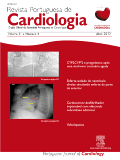
Revista Portuguesa de Cardiologia
Fostering collaboration and knowledge in the heart of cardiology.Revista Portuguesa de Cardiologia, published by Elsevier España SLU, stands as a pivotal resource in the realm of Cardiology and Cardiovascular Medicine. With its origins tracing back to 1970, this journal has cultivated a robust academic presence, achieving a 2023 Q3 ranking in its category, and currently holding a position of #220 out of 387 on the Scopus rankings, placing it within the 43rd percentile of its field. This open access journal, available since 2011, aims to disseminate high-quality research and insights relevant to contemporary cardiovascular issues. Its commitment to accessibility and knowledge exchange enhances its importance for clinicians, researchers, and students alike, fostering a more informed community in the fight against cardiovascular diseases. Operating from its base in Barcelona, Spain, the journal welcomes contributions that further the understanding and treatment of heart conditions, contributing significantly to the advancement of cardiovascular health.
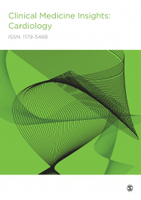
Clinical Medicine Insights-Cardiology
Exploring Cutting-Edge Research in Cardiovascular HealthClinical Medicine Insights-Cardiology is a prestigious open-access journal published by SAGE Publications Ltd, focusing on cutting-edge research in the field of cardiology and cardiovascular medicine. With the ever-evolving landscape of cardiovascular health, this journal serves as a vital platform for disseminating significant findings, clinical practices, and innovative therapies. Established in 2007, it has rapidly gained recognition, currently ranked in the Q2 category for cardiology, positioned at #112 out of 387 in Scopus Rankings, and boasting a commendable 71st percentile. The journal not only emphasizes the integration of recent advancements in clinical and laboratory studies but also aims to bridge the gap between research and practice, making it an essential resource for researchers, healthcare professionals, and students alike. Situated in New Zealand and operating with an open-access model, Clinical Medicine Insights-Cardiology promotes the unrestricted dissemination of knowledge, ensuring that critical insights into cardiovascular medicine are accessible globally.
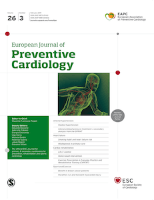
European Journal of Preventive Cardiology
Advancing cardiovascular health through innovative research.The European Journal of Preventive Cardiology, published by Oxford University Press, is a leading international journal dedicated to the field of cardiology and cardiovascular medicine. With an impact factor that underscores its prestige—ranking in the top quartile (Q1) of both cardiology and epidemiology categories—the journal serves as a critical resource for researchers and practitioners seeking to advance their understanding of preventive strategies in cardiovascular health. Since its inception in 1999, it has provided a platform for high-quality research and reviews that address the epidemiology of cardiovascular diseases, risk factor management, and innovative prevention methodologies. Notably, it currently ranks #21 out of 387 in Medicine - Cardiology and #13 out of 148 in Medicine - Epidemiology according to Scopus, highlighting its influential position in these essential biomedical fields. The journal also provides open access options, allowing both readers and authors the opportunity to engage with groundbreaking research and enhance the dissemination of knowledge. With a commitment to excellence, the European Journal of Preventive Cardiology is an invaluable asset for those dedicated to the prevention of cardiovascular diseases.
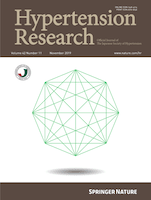
HYPERTENSION RESEARCH
Fostering knowledge exchange in cardiovascular medicine.HYPERTENSION RESEARCH, published by SpringerNature, serves as a premier platform in the field of Cardiology and Cardiovascular Medicine, Internal Medicine, and Physiology. Since its inception in 1992, the journal has built a substantial reputation, currently ranked in the second quartile (Q2) across several categories in 2023, reflecting its influence and high-quality contributions to medical research. With a focus on hypertension, the journal aims to disseminate vital research findings, clinical studies, and innovative treatment strategies to a diverse audience of researchers, healthcare professionals, and students, fostering knowledge exchange in the management of hypertensive conditions. Although it is not an Open Access journal, it offers comprehensive access to its extensive archive of valuable resources, ensuring that critical advancements in the understanding of hypertension are both accessible and impactful. HYPERTENSION RESEARCH is not only essential for those directly involved in cardiovascular and internal medicine practices but also for interdisciplinary scholars who are looking to explore the intersections of physiology and other biomedical fields in their work.

Frontiers in Cardiovascular Medicine
Elevating Cardiovascular Research Through Open Access.Frontiers in Cardiovascular Medicine is a leading open-access journal published by FRONTIERS MEDIA SA, dedicated to advancing research in the field of cardiology and cardiovascular medicine. Since its inception in 2014, the journal has become a vital platform for the dissemination of high-quality research, boasting a commendable Q2 rank in the 2023 category for Cardiology and Cardiovascular Medicine. With a focus on promoting innovative studies and clinical insights, Frontiers in Cardiovascular Medicine facilitates open access to its content, allowing researchers, healthcare professionals, and students from around the globe to engage with the latest findings which are critical for the advancement of cardiovascular health. The journal's significant presence in the academic landscape, as indicated by its Scopus ranking (161/387 and 58th percentile), underscores its importance as a research outlet in this essential field. Located in Lausanne, Switzerland, the journal continues to support the global cardiovascular community by encouraging collaboration and knowledge sharing to address the challenges faced in cardiovascular medicine today.

Minerva Cardiology and Angiology
Shaping the future of cardiovascular health through scholarship.Minerva Cardiology and Angiology, published by EDIZIONI MINERVA MEDICA, is a prominent journal in the field of cardiology and cardiovascular medicine, with an ISSN of 2724-5683 and E-ISSN of 2724-5772. Established in 2021, this journal aims to foster the dissemination of cutting-edge research, clinical practice guidelines, and innovative methodologies relevant to cardiovascular health. As of 2023, it holds a commendable Q3 quartile rank in its category, reflecting its growing influence within the scientific community. The journal is indexed in Scopus, where it ranks #221 out of 387 in its field, placing it in the 43rd percentile overall. Although it currently does not offer Open Access options, articles published in Minerva Cardiology and Angiology contribute significantly to ongoing discussions and advancements in heart and vascular health. The journal serves as an invaluable resource for researchers, healthcare professionals, and students seeking to stay informed on the latest developments in cardiology.
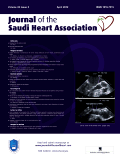
Journal of the Saudi Heart Association
Pioneering Insights in Cardiovascular Medicine Since 2009The Journal of the Saudi Heart Association is a prominent scholarly publication dedicated to advancing knowledge in the fields of cardiology and cardiovascular medicine. Published by DIGITAL COMMONS BEPRESS, this open-access journal has been serving the global community since 2009, providing a vital platform for researchers, practitioners, and students interested in the latest developments in heart health and disease management. With an ISSN of 1016-7315 and a growing repository of knowledge alongside an E-ISSN of 2212-5043, the journal showcases an array of peer-reviewed articles that contribute to the understanding of cardiovascular conditions. Although categorized in the Q4 quartile for 2023, it remains committed to offering valuable insights, particularly within the constraints of the 29th percentile rank specified by Scopus. As the journal converges towards 2024, it continues to foster collaboration, innovation, and inquiry within the Saudi Arabian and international medical communities.
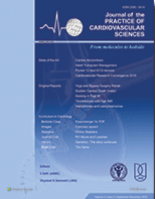
Journal of the Practice of Cardiovascular Sciences
Exploring New Frontiers in Cardiovascular SciencesJournal of the Practice of Cardiovascular Sciences, published by Wolters Kluwer Medknow Publications, is an esteemed Open Access journal dedicated to advancing knowledge in the field of cardiovascular health. With its ISSN 2395-5414 and E-ISSN 2454-2830, the journal serves as a vital platform for researchers, healthcare professionals, and students to disseminate and access high-quality studies, innovations, and practical applications related to cardiovascular sciences. Established in 2015 as an Open Access journal, it promotes widespread sharing of insights to enhance cardiovascular practices and address contemporary challenges in the field. As part of a reputable publishing group, the journal is poised for growth and impact, contributing significantly to the ongoing dialogue in cardiovascular research and clinical practice.

Current Atherosclerosis Reports
Connecting research to clinical practice in cardiology.Current Atherosclerosis Reports, published by CURRENT MEDICINE GROUP, is a leading scientific journal in the field of Cardiology and Cardiovascular Medicine, boasting an impressive Q1 ranking in its category as of 2023. This esteemed journal, with an ISSN of 1523-3804 and an E-ISSN of 1534-6242, has been a cornerstone of cardiovascular research since its inception in 1999, continuing to publish cutting-edge studies through 2024. With unparalleled insights into the mechanisms, prevention, and treatment of atherosclerosis, it serves as an essential resource for researchers, healthcare professionals, and students alike. Although not an open-access journal, it is highly regarded within the academic community, highlighted by its Scopus rank of #54 out of 387 in its field, placing it in the 86th percentile. The journal's commitment to advancing knowledge in cardiovascular health underscores its integral role in guiding clinical practices and influencing future research directions.

Netherlands Heart Journal
Empowering Cardiovascular Excellence Through Collaborative ResearchNetherlands Heart Journal is a premier academic publication dedicated to advancing knowledge in the field of cardiology and cardiovascular medicine. Published by BOHN STAFLEU VAN LOGHUM BV, this journal has established itself as a critical platform for researchers, professionals, and students seeking to explore groundbreaking findings and innovative practices in cardiovascular health. With an ISSN of 1568-5888 and E-ISSN 1876-6250, the journal boasts a respectable Q2 ranking in the Cardiology and Cardiovascular Medicine category, placing it in the top half of its field according to the 2023 quartiles. The Scopus ranking places it 130th out of 387 in the relevant category, indicating a commendable percentile rank of 66th, which attests to its influence and quality of published research. Spanning from 2005 to 2024, the journal endeavors to include a diverse array of topics, encompassing clinical practice, technological innovations, and public health considerations related to cardiovascular diseases. Researchers and practitioners are encouraged to engage with the journal's robust content, contributing to and benefiting from the collaborative effort to enhance cardiovascular health worldwide.